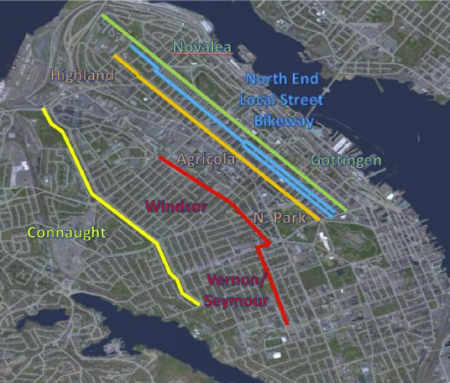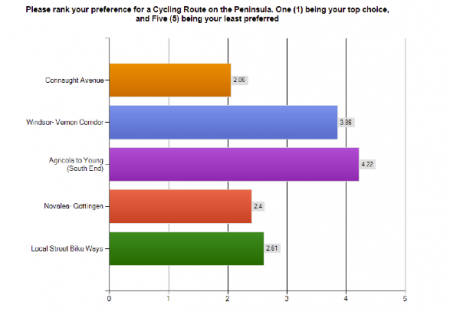City staff have recommended against an Agricola Street bike lane.
Instead, a staff report released last week says a route along Windsor and Vernon Streets would be best.
The Active Transportation Advisory Committee will meet at 4 p.m. today at the former Bloomfield school to discuss the recommendation.
Of five north-south options for the cross-town connector, the Agricola route was the top pick in public consultations. The Windsor-Vernon-Seymour corridor was a close second. The Halifax Cycling Coalition also preferred the Agricola option, and asked for one bike lane running down the west side of the street.
The North End Business Association opposed the Agricola option, saying the loss of parking would hurt business. Although parking would be allowed in the bike lane for loading purposes, the NEBA said it might be too dangerous for cyclists.
What’s not clear, though, is exactly how many Agricola businesses are against a bike lane.
Bridge Brewing, for instance, spoke out yesterday on Twitter saying they were not consulted about the cross-town connector. The brewery opened in late January, after public consultations had ended.
“NEBA does not represent our position on the [cross-town connector],” the brewery tweeted yesterday. “We are pro and we expressed our position to our councillor.”
Neither the HCC nor the NEBA polled Agricola Street businesses about the bike lane. NEBA executive director Bernie Smith said Wednesday he spoke to many of the businesses and got the feeling they were mostly opposed, but he didn’t take a survey of which were for, against or neutral.
The staff report recommends opposing a bike lane on Agricola Street “due to almost unanimous opposition by abutting businesses to the loss of on-street parking and because there is another potential option for a north-south bicycle route on the east side of the peninsula.”
“About five businesses stated that they would close if on-street parking was removed,” the staff report says. “The businesses asserted that access to parking is already a significant impediment to success in the area and that removing parking would hinder the commercial resurgence now underway.”
Only two business owners independently expressed no concern, staff wrote.
Staff received several studies relating to parking and business, the report says, but none of these factored into the final decision.
“…[T]he potential economic impact of adding bike lanes and removing on-street parking on Agricola Street was not a factor in route assessment, except as capture in the stakeholder and public feedback criteria,” the staff report states.
Study: Businesses over-estimate customers arriving by car
One such study mentioned in the report, conducted in the fall of 2012 by a Dalhousie Masters in Urban Planning student, measured Agricola business owners’ perceptions of how their customers travel and shop, and compared those perceptions to the reality of how customers travel and spend their money.
The author of the paper, Josh DeJong, found that 44 per cent of business owners anticipate a similar number of customers if parking was removed.
DeJong also found business owners overestimate the percentage of their customers who drive, and underestimate those who walk and cycle. His data showed 70 per cent of customers walk to Agricola Street when shopping.
On a monthly basis, customers who arrive by foot or bicycle visit more frequently and spend more money than those who drive, on average, DeJong found.
Nearly 30 per cent of on-street parking spaces were occupied by employees of businesses, he wrote, and while parking occupancy is high, turnover is low.
“Findings suggest that the misconception of customer travel behavior has resulted in too much parking capacity on Agricola, which is vulnerable to abuse by non customers. The current demand, 51 per cent occupancy during peak hours, could still be accommodated if the number of spaces were reduced.”
“In some cases, understanding people’s perceptions of accessibility is as important as accessibility itself,” DeJong noted, citing research that showed businesses may initially oppose changes that compete with on-street parking for road space, but eventually warm to the idea once benefits become clear.
Smith and staff point to other options
“No one wants to dis-accommodate cyclists, in fact we’re delighted that people should cycle,” Smith said Wednesday.
Instead of a bike lane on Agricola, Smith said the speed limit should be decreased to 25 or 30 km per hour, and “sharrows”—share the road signs—should be added to the street.
During the public consultation, however, many people named “sharrows” as the one thing they didn’t want to happen.
More than half those consulted identified themselves as cyclists while only 16 per cent identified themselves as a “business owner or close to a candidate route.”
Alternatively, Smith said side streets such as Maynard, Creighton and Isleville Streets should be made into bike routes. Staff are warm to this option.
HCC member Clive MacGreggor, who also sits on the ATAC, said Wednesday it’s unclear how many cyclists use Agricola Street compared to side streets. HCC thought HRM would do a count, as they do in other areas of the city, but that didn’t happen. MacGreggor said the HCC is planning to do a count in the future.





